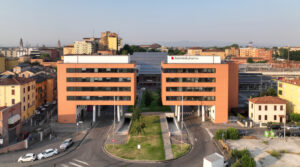Environmentally friendly packaging for the pharmaceutical industry
Italian company focuses on special sustainability strategy
Bormioli Pharma, a leading company for pharmaceutical packaging solutions, recently presented its “EcoPositive” environmentally friendly packaging portfolio, which includes over 3,000 items made of plastic and glass. According to the company, the plastic packaging segment recorded volume growth of 304% in 2021 and is part of the company’s ‘50-in-5’ strategy. This strategy aims to achieve a 50% share of sustainable materials in the products sold by 2025: in 2023, this share was already 45% and a further increase was forecast for 2024.

The three company’s principles being pursued are ‘Regenerate’ (glass and plastic packaging that is recycled from first-choice waste collection, such as rPET and rHDPE bottles), ‘Renew’ (packaging made from bioplastics that are obtained from renewable sources, such as bio-PET-based or bottles and caps made from Green PE and Green PP), as well as ‘Reloop’ (products made from glass and advanced polymers, which are manufactured from materials that can be recycled indefinitely, such as carbon capture PET bottles or advanced rPET bottles).
The company works with various partners to implement this, including the recycler Loop Industries, which uses depolymerisation and monomer isolation to process even heavily contaminated PET waste into high-quality recyclate for demanding applications.
The EcoPositive area currently accounts for 50% of Bormioli Pharma’s standard catalogue. In-house and third-party analyses show that the company’s own rHDPE bottles have a 28% reduction in migrating compounds compared to conventional solutions made from virgin HDPE.
A study on Bormioli’s rPET bottles by the specialised laboratory Lab Analysis and with a report by the Mario Veronesi Technopole Institute in Mirandola (Modena, Italy) showed that bottles made of 100% rPET from Loop Industries did not contain any toxicologically relevant extractable substances and therefore met the necessary requirements for pharmaceutical applications. The results of the study also showed that bottles produced with Loop PET outperform bottles made from untreated PET, which already fully comply with the European Pharmacopoeia limits for extractables, by around 90%.
A few days ago, a new partnership was entered into with Chiesi, an international biopharmaceutical company, to produce Carbon Capture PET bottles for a drug for the prophylaxis and treatment of rhinitis, a packaging innovation in the field of pharmaceutical packaging. Compared to conventional PET, Carbon Capture PET reduces CO2 emissions by 21.9% and has comparable properties to standard PET. It is produced from CO2 emissions and converted by fermentation into bio-MEG, which is used to produce PET. The material is regularly recyclable. Two companies are significantly involved in the production of carbon capture PET: LanzaTech, which is responsible for the production of Bio-MEG, and Plastipak, a leading manufacturer of recycled resins based in Italy.
Another supplier of Bio-MEG is UPM with its biorefinery based in Leuna, eastern Germany. UPM’s ‘BioPura’, bio-MEG made from sustainably collected hardwood from carefully managed forests, is used by Bormioli Pharma to produce its bio-PET bottles (see PETplanet 7+8 2023, p. 10-12). Regionally collected wood is processed at UPM, where it is converted into sugar, which in turn is used to produce bio-MEG. Bormioli currently has an annual turnover of over USD 400 million.
Photo top: Carbon Capture PET bottles

